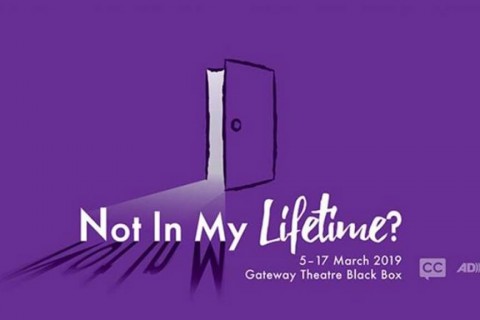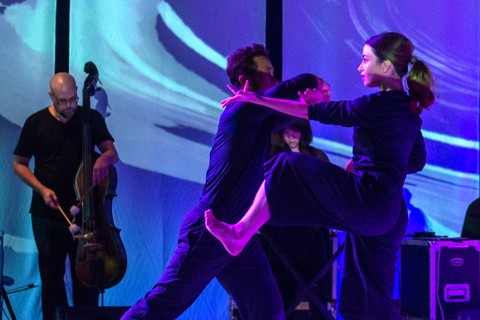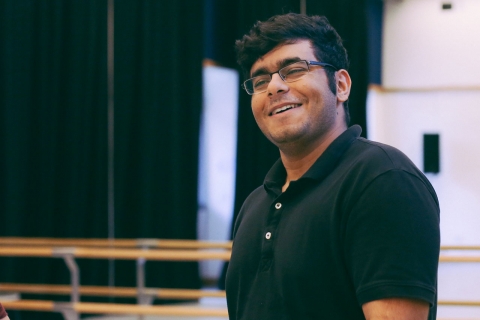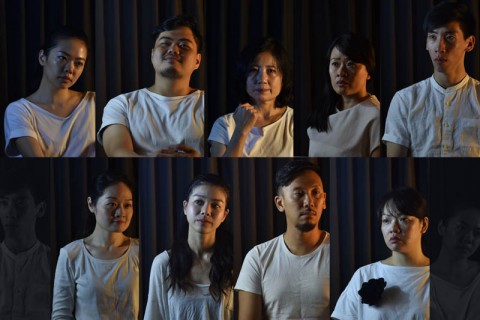Director Tan Beng Tian has been toying with the idea of inclusive arts for the past two years - how she can work with artists with different needs and how to make theatre more accessible to differently-abled persons. This March, Beng Tian collaborates with a team of creatives from diverse backgrounds and experiences in theatre making, including Alvan Yap as playwright, Lim Chin Huat as production designer and Timothy Nga doing audio description as part of the inclusive access the production offers.
Not In My Lifetime? explores the special education system in Singapore, based on the experiences of the playwright. Alvan has been an educator, writer and editor for 16 years. His stint as a special education teacher included a year-long overseas assignment with the Singapore International Foundation. Alvan has also worked as an advocate with the Disabled People’s Association. Not In My Lifetime? stems from his teaching experiences. In one of the rehearsals, we see disgruntlement but also gratitude in the stories he tells. We speak to Alvan to find out if it was mentally stressful for him to recount these memories and what we could do to contribute to the awareness of inclusivity that is slowly building up.

1. Was the writing process mentally or emotionally difficult given that you have to draw form your personal memories, whether good or bad?
It was not a problem. Rather, my memories, thoughts and experiences of being a SPED teacher fuelled my writing. I had something to say, a story to tell, and I wanted more people to know more about this issue.
2. What were you unhappy about the care given to special needs children, and the whole structure of education for them, having been a special needs teacher previously
Special education tends to be associated with charity, doing good (on the part of teachers, volunteers, etc), and a social welfare issue - instead of being primarily about education per se. Why? Part of it comes down to the disparity/gaps between the mainstream and special education systems - in terms of which ministries are responsible, which agencies are in charge, who develops the curriculum and frameworks for special education, the teachers’ career prospects and salaries.
3. How did the dramaturg (Faith Ng) and director (Tan Beng Tian) come into play? How did they see things differently from you? How did the three of you work things out to bring out the best for the play artistically, but also staying true to what you had wanted to express originally?
They are valuable to the script development process in many ways. First, they are experienced theatre people, and they gave much good advice and encouragement. This is my first play and I’m also not well versed in theatre (or any performing arts sphere in fact).
They guided me and kept me on track: What do I really want to say? How does this help to convey the message? Write from the heart. Highlight scenes and lines which don’t ring true or which were overly written.
I am happy to accept their suggestions and made changes accordingly. But not all. For example, I did not include specific incidents relating to my own teaching days - though they found these interesting and suggested incorporating them - because I did not want the students in the play to be linked to any specific disability.
4. How do you think a person without disability can become more sensitive and aware of the vocabulary he/she can use to address a particular group of persons with disability without any intentions to ridicule? There is a fear that those with good intentions might overcompensate, or the ignorant ones use an insensitive term. What is a good way to come around this issue of addressing?
The best and most simple way to avoid using terms or words which might cause offence is to ask. Ask the person with the disability what term he or she prefers. And respect the person’s preference.
Sometimes it’s not possible to do that, perhaps because the person being described is a child (and doesn’t know) or we do not have the chance to ask directly. Then we can refer to resources such as this Disability Glossary.
At the very least, we can surely take care enough to avoid using the worst and the most unacceptable terms such as ‘handicapped’, ‘retarded’ and ‘deaf and mute’. (It wasn’t that long ago such terms were in print even in the mainstream media.)
But the most important point, for me, is: First, ask ourselves why we need to mention the disability, whether it’s of a group, one person, or a child. What’s the context? Is it necessary to include this particular trait of the person/group? Is there any element, perhaps unconsciously, of labelling or identifying these persons based on their disability?
== Following content may contain spoilers ==
5. As a deaf person, what do you think about the scene where one of the characters had a meltdown, and the teacher character was singing a song to calm her down? I felt that the scene for me was banking on an audio experience, did you feel that the scene might not be accessible to some audiences?
The scene was equally visual, what with the violent movements of the blanket and the teacher getting thrown off when she tried to subdue it. For the deaf, including myself, we tend to rely on what we see to help us make sense of the world and for communication. Even for those among us who make use of our hearing (like I do when I put on my hearing aids), we may not fully understand what we hear, so our eyes do double duty in a way.

------
Read our interview with audio describer Timothy Nga here!
------
Not In My Lifetime?
by The Finger Players
Date: 5 - 17 Mar 2019
Venue: Gateway Theatre
Visit event page

 Kali Yuga - Interview with SAtheCollective
Kali Yuga - Interview with SAtheCollective
 On the Couch with Uday Duggal – Orpheus to Couch Theatre’s Eurydice
On the Couch with Uday Duggal – Orpheus to Couch Theatre’s Eurydice
 Off stage interview with Emergency Shelter
Off stage interview with Emergency Shelter